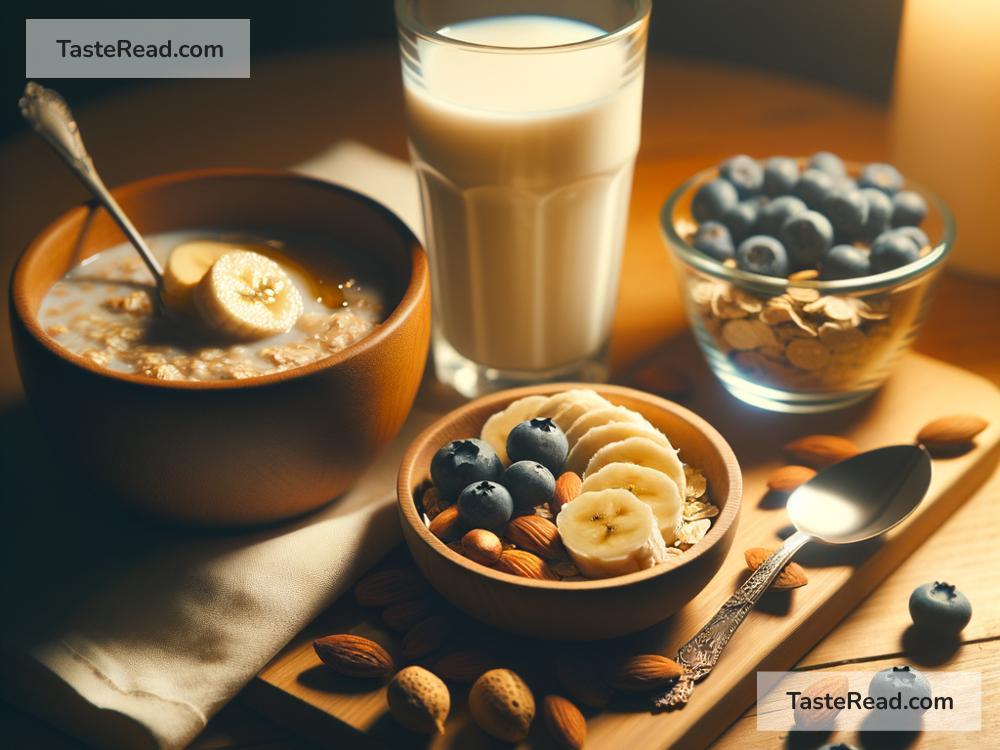Foods for Reducing Sleep Disturbances: What to Eat for a Better Rest
Getting a good night’s sleep is essential for feeling energized, focused, and healthy. However, sleep disturbances—such as waking up in the middle of the night, trouble falling asleep, or feeling restless—can disrupt your rest and negatively impact your well-being. While there are many factors that influence sleep, what you eat can play an important role in improving sleep quality. By adding certain foods to your diet, you may help your body relax, fall asleep faster, and stay asleep longer.
In this article, we’ll explore foods that promote better sleep, why they work, and how you can include them in your meals and snacks. Let’s dive in!
How Food Affects Sleep
Certain nutrients in food can influence your sleep patterns. For example:
– Melatonin: This is a hormone that regulates your sleep-wake cycle, helping you feel sleepy at night and awake during the day. Some foods naturally contain melatonin or stimulate its production in your body.
– Tryptophan: This is an amino acid that helps your brain produce serotonin, a chemical that promotes relaxation and can later be converted into melatonin.
– Magnesium and Potassium: These minerals help calm your muscles and nervous system, reducing tension that might keep you awake.
– Complex Carbohydrates: These support the release of serotonin and help stabilize blood sugar levels, which can keep your sleep uninterrupted.
By eating foods rich in these nutrients, you may be able to reduce sleep disturbances naturally.
Sleep-Friendly Foods to Try
Here are some foods to consider adding to your diet if you’re struggling with sleep problems:
1. Bananas
Bananas are a great source of magnesium, potassium, and tryptophan. These nutrients help relax your muscles and encourage a state of calmness before bed. Snack on a banana in the evening or blend it into a bedtime smoothie with milk.
2. Almonds and Walnuts
Both almonds and walnuts contain magnesium and melatonin, which help promote deep sleep. A small handful of nuts makes for a healthy and sleep-supporting snack. Be sure to eat them in moderation since nuts are calorie-dense.
3. Tart Cherries or Cherry Juice
Tart cherries are one of the best natural sources of melatonin. Drinking tart cherry juice or eating fresh cherries in the evening can help regulate your sleep cycle. Studies have shown that people who consumed tart cherry juice experienced improved sleep duration and quality.
4. Whole Grains
Whole grains like oatmeal, brown rice, and quinoa can help balance your blood sugar and release serotonin in your brain. Eating a small bowl of oatmeal in the evening is a comforting way to prepare your body for rest. Add a sprinkle of cinnamon or sliced banana for extra sleep-friendly benefits.
5. Fatty Fish
Salmon, trout, and other fatty fish are high in omega-3 fatty acids and vitamin D, which play a role in serotonin production. Studies suggest that eating fatty fish is linked to improved sleep quality. Serve some salmon with a side of roasted vegetables for dinner to support better rest.
6. Herbal Teas
Certain herbal teas, like chamomile, peppermint, and valerian root, are known for their calming properties. Chamomile, in particular, contains apigenin, an antioxidant that may reduce anxiety and help you fall asleep. Sip on a warm cup of herbal tea about 30 minutes before bed.
7. Milk and Dairy Products
Warm milk is a classic remedy for sleep issues, and there’s science behind it. Milk contains tryptophan, calcium, and melatonin, making it a soothing drink to help you relax. Other dairy products like yogurt and cheese also contain tryptophan. Enjoy a small glass of milk or a light yogurt snack in the evening.
8. Kiwi
This little green fruit is packed with antioxidants, such as vitamin C and vitamin E, as well as serotonin. Research has shown that eating kiwi regularly can help people fall asleep faster and experience better sleep quality. Try adding sliced kiwi to your evening snack routine.
9. Sweet Potatoes
Rich in complex carbohydrates and potassium, sweet potatoes are another excellent choice for promoting relaxation. Roast or mash them as part of your dinner to help ease you into a restful sleep.
10. Spinach and Leafy Greens
Dark leafy greens like spinach, kale, and Swiss chard are full of magnesium, which helps calm your nervous system and relax your muscles. Pair leafy greens with your dinner to create a satisfying, sleep-friendly meal.
Foods to Avoid Before Bed
While some foods help encourage sleep, others can interfere with it. Avoid these items in the hours leading up to bedtime:
– Caffeine: Found in coffee, tea, soda, and chocolate, caffeine is a stimulant that can keep you awake.
– Heavy, greasy meals: These can cause indigestion and discomfort, making it harder to fall asleep.
– Alcohol: While alcohol might make you feel drowsy at first, it can disrupt your sleep cycles and make you wake up during the night.
– Sugary snacks: Foods with high sugar content can cause blood sugar spikes and crashes, leading to restless sleep.
Conclusion
If you’re struggling with sleep disturbances, changing your diet can be a helpful step toward better rest. By focusing on sleep-friendly foods like bananas, almonds, tart cherries, and herbal teas, you can give your body the nutrients it needs to relax and support a good night’s sleep. At the same time, avoid stimulants and heavy foods that could disrupt your slumber.
Remember that improving sleep is about creating consistent, healthy habits. In addition to eating the right foods, try going to bed at the same time each night, keeping your bedroom cool and dark, and relaxing before sleep. With these tips, you’ll be on your way to waking up refreshed and ready to take on the day!


